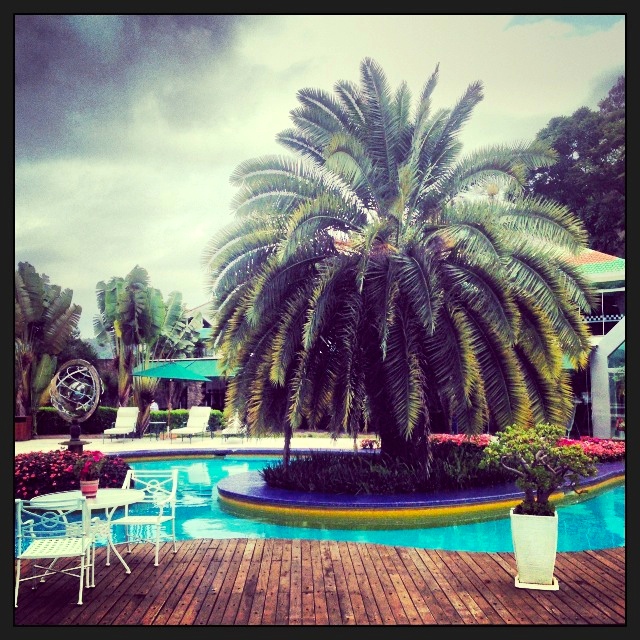
When Hotel Unique, São Paulo city’s rock-star boutique hotel of choice, opened in 2002, it certainly turned heads in this megalopolis of 20 million or so. Its unorthodox design (jokingly described by locals as a little watermelon slice), and its design hotel aesthetic, were both novelties at the time (and, in all honestly, still are). So, three years later, when the hotel’s countryside cousin opened its door 25 miles or so north of the city, expectations were a mix of huge and skeptical.
Getting to the 27-room property (doubles from $682) is certainly interesting. Shortly after you begin to ascend into the Serra da Cantareira mountains north of São Paulo, you take an exit to what seems like Nowheresville. Within minutes you arrive at a tall, nondescript entry gate. Through the security gates, you enter a calm new world, the brainchild of Lithuanian immigrant Victor Siaulys, who is revered as a bit of a messiah in these parts, at least when it comes to living well and righteously.
On the expansive property, Siaulys, who passed away in 2009, created a world of wellness and rehabilitation on grounds that include the most stunning and extensive floral gardens I have ever seen (Impatiens, tended to by Japanese specialists); a small manmade lake; extensive herb gardens (more than 100 on property); a wild animal rehabilitation center that is home to a wealth of adorable critters like spider monkeys, pampas foxes, and striped owls, either being rehabilitated for return to the wild or, when return is no longer an option, cared for until their time comes; and, the main event, a 2,000-square-meter, 80-treatment spa housed inside a massive den of Zen converted from former housing for blind children—Siualys’ daughter is blind, and the property was originally built as a summer getaway escape from the city for blind children. In other words—the guy is a saint.
The property was originally built as a summer getaway escape from the city for blind children. In other words—the guy is a saint. But does his legacy include a spa that doesn’t disappoint?
But does his legacy include a spa that doesn’t disappoint (rare in Brazil)? I book three treatments via the iPad I was given at check-in to handle anything and everything. We book spa appointments, dinner reservations, order room service—bucket of ice for sunset cocktails—and check out via the iToy, and I’m left wondering how it is I have never seen this before? At any rate, I enter under the shadow of a massive tea tree (the actual tree itself, called Melaleuca, which I had never seen before, either). I live in São Paulo, so saying how much I need some therapeutic calm goes without saying.
On arrival, guests are treated to an elaborate foot bath and foot rub with white clay laced with essential mint oil. I usually find the foot-bath ritual a bit of gimmicky nonsense, but this was actually quite pleasant and designed more as a pre-relaxation technique than an excuse to make sure your feet are clean.
The spa has an Ayurvedic component, so after filling out the Vata/Pitta/Kapha questionnaire, I’m glazed in sandalwood, lavender, and lemongrass oil for the Indian Massage ($118)—not drowned, mind you, like the last time I was in India, when I felt like I’d just coached a team to the Cricket World Cup championship and a bucket of oil was dumped over my head instead of Gatorade. It may not be as authentically Ayurvedic, but I actually prefer the Brazilian-ized version.
I stay closer to home for my second treatment, Saüc ($212), one of the signature experiences at Unique Gardens. It starts with a messy full-body exfoliation (Himalayan salt, grains of sesame and oats, and Elderberry leaves), followed by a relaxing bath (rosemary, lavender, and Elderberry) and full-body massage (lavender and rosemary). It rubs me the right way.
Between treatments, you can roam the pleasant grounds, visit the animal rehabilitation area, or just hang out with the views in your bi-level chalet, playing with your iPad. The one spot Unique Gardens falls short is at the restaurant, where, according to in-house literature, the chef trained under Ferran Adrià (of elBulli fame). Adrià disciples carry with them a hefty amount of expectation and, although the cuisine isn’t bad per se, it just didn’t turn my head like a little watermelon.
Kevin Raub
Kevin Raub is a European-based journalist who has covered travel and entertainment for a variety of publications, including Travel+Leisure, Condé Nast Traveller, and New York Times T Magazine. He is also the author of over 80 Lonely Planet travel guides. Follow Kevin's adventures @RaubonTheRoad on Instagram and Twitter; and at www.kevinraub.net.